

Expanded Academic ASAP - Document. Full Text: Awareness of what one knows or doesn't know falls under the heading of metacognition, the active process of knowing.
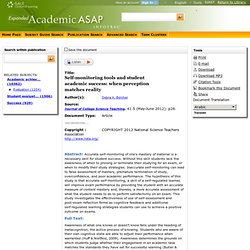
Students who are aware of their own cognitive state are able to adjust their performance when warranted (Huff & Nietfeld, 2009). Awareness determines the grounds on which students judge whether their engagement in an academic task matches the standards they have set for successful learning (Butler & Winne, 1995). Yet the use of cognitive strategies, those that allow one to learn, remember and understand, alone is not enough. Tools for metacognition. Metacognition is an important part of intentional learning, since it involves actively thinking about what you know, what you don’t know, and how you can get better at knowing and applying what you know.
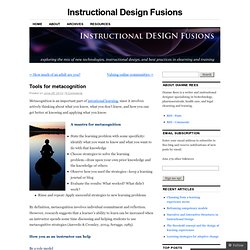
A mantra for metacognition State the learning problem with some specificity: identify what you want to know and what you want to do with that knowledgeChoose strategies to solve the learning problem—draw upon your own prior knowledge and the knowledge of othersObserve how you used the strategies—keep a learning journal or blogEvaluate the results: What worked? Self monitoring strategies. Smart Strategies That Help Students Learn How to Learn. Teaching Strategies Bruce Guenter What’s the key to effective learning?
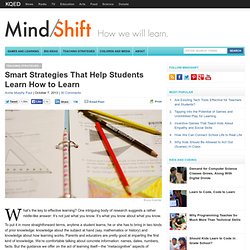
One intriguing body of research suggests a rather riddle-like answer: It’s not just what you know. It’s what you know about what you know. To put it in more straightforward terms, anytime a student learns, he or she has to bring in two kinds of prior knowledge: knowledge about the subject at hand (say, mathematics or history) and knowledge about how learning works. In our schools, “the emphasis is on what students need to learn, whereas little emphasis—if any—is placed on training students how they should go about learning the content and what skills will promote efficient studying to support robust learning,” writes John Dunlosky, professor of psychology at Kent State University in Ohio, in an article just published in American Educator. “Teaching students how to learn is as important as teaching them content.” Teaching Metacognition. This webpage is a summary, written by Carol Ormand, of Marsha Lovett's presentation at the 2008 Educause Learning Initiative conference.
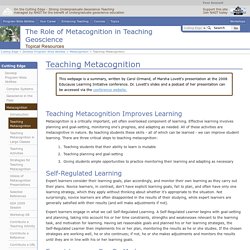
Dr. Lovett's slides and a podcast of her presentation can be accessed via the conference website. Teaching Metacognition Improves Learning Metacognition is a critically important, yet often overlooked component of learning. A Metacognitive Peer Tutoring Model: Linking Thinking, Learning and Performance in a Peer Tutoring Program.
What can be gleaned from analyzing two years of metacognitive tutoring documentation reports?
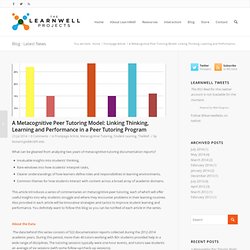
Invaluable insights into students’ thinking,Rare windows into how students’ interpret tasks,Clearer understandings of how learners define roles and responsibilities in learning environments,Common themes for how students interact with content across a broad array of academic domains. This article introduces a series of commentaries on metacognitive peer tutoring, each of which will offer useful insights into why students struggle and where they encounter problems in their learning routines. Also provided in each article will be innovative strategies and tactics to improve student learning and performance. You definitely want to follow this blog so you can be notified of each article in the series.
About the Data The data behind this series consists of 522 documentation reports collected during the 2012-2014 academic years. That’s me in the pic. Growing our mindset. This time last year I read Dweck’s ‘Mindset’.
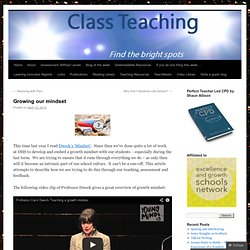
Since then we’ve done quite a lot of work at DHS to develop and embed a growth mindset with our students - especially during the last term. We are trying to ensure that it runs through everything we do – as only then will it become an intrinsic part of our school culture. It can’t be a one-off. This article attempts to describe how we are trying to do this through our teaching, assessment and feedback. How Questions Promote Cognitive, Social, and Emotional Learning Across Subject Areas. In the last blog, we took a look at the perspective of perspective of Irving Sigel on the importance of asking different kinds of questions as a way of deepening students' social, emotional, and cognitive learning.
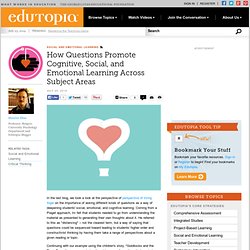
Coming from a Piaget approach, Irv felt that students needed to go from understanding the material as presented to generating their own thoughts about it. He referred to this as "distancing" -- not the clearest term, but a way of saying that questions could be sequenced toward leading to students' higher order and constructivist thinking by having them take a range of perspectives about a given reading or topic. Coached Through College: Professional Motivators Decrease Dropout Rates. When she became the first person in her family to graduate from college, Virginia Hughes invited the three people she credited most with getting her to that milestone: her mother, her grandmother and a retired hospital administrator named Laura Harrill.
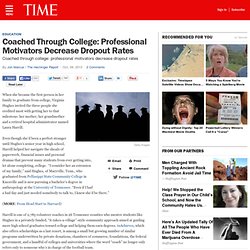
Even though she’d been a perfect stranger until Hughes’s senior year in high school, Harrill helped her navigate the shoals of paperwork, financial issues and personal dramas that prevent many students from ever getting into, let alone completing, college. “I consider her an extension of my family,” said Hughes, of Maryville, Tenn., who graduated from Pellissippi State Community College in Knoxville and is now pursuing a bachelor’s degree in anthropology at the University of Tennessee.
“Even if I had a bad day and just needed somebody to talk to, I knew she’d be there.” (MORE: From Head Start to Harvard) The results, according to studies conducted by researchers at Stanford and elsewhere, are encouraging. (MORE: A Is For Adaptive) Self Regulation. Implementing Self-Regulation and Self-Monitoring in the Classroom What is Self-Regulation?
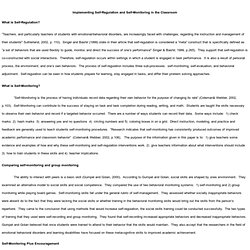
“Teachers, and particularly teachers of students with emotional/behavioral disorders, are increasingly faced with challenges, regarding the instruction and management of their students" Sutherland, 2002, p. 110). Singer and Bashir (1999) state in their article that self-regulation is considered a “meta” construct that is specifically defined as “a set of behaviors that are used flexibly to guide, monitor, and direct the success of one’s performance" Singer & Bashir, 1999, p.265). Self-Monitoring, Human Nature, and Sustained Learning « Professional Sport Psychology Symposium. It is a psychological reality that self monitoring enhances learning and ultimately enhances performance on the playing field.
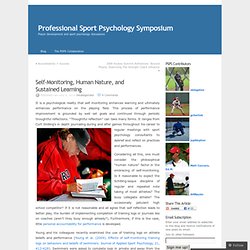
This process of performance improvement is grounded by well set goals and continued through periodic thoughtful reflections. “Thoughtful reflection” can take many forms. It ranges from Curt Shilling’s in depth journaling during and after games throughout his career to regular meetings with sport psychology consultants to debrief and reflect on practices and performances. Self-Directed Learning in Problem-Based Learning and its Relationships with Self-Regulated Learning. Problem-based learning: future challenges for educational practice and research - Dolmans - 2005 - Medical Education. Student learning strategies, mental models and learning outcomes in problem-based and traditional curricula in medicine, Medical Teacher, Informa Healthcare. Original Student learning strategies, mental models and learning outcomes in problem-based and traditional curricula in medicine 2006, Vol. 28, No. 8 , Pages 717-722 (doi:10.1080/01421590601105645)
Proto-professionalism: how professionalisation occurs across the continuum of medical education - Hilton - 2004 - Medical Education. Workplace-based assessment as an educational tool: AMEE Guide No. 31, Medical Teacher, Informa Healthcare. AMEE Guide Workplace-based assessment as an educational tool: AMEE Guide No. 31 2007, Vol. 29, No. 9-10 , Pages 855-871 (doi:10.1080/01421590701775453) John Norcini1† and Vanessa Burch2 1Foundation for Advancement of International Medical Education and Research, PhiladelphiaUSA 2University of Cape Town, South Africa JOHN J. VANESSA C. How can we foster Self Regulated Learning? (Drs. Deborah Butler & Nancy Perry - Part 3.
How can we foster Self Regulated Learning? (Drs. Deborah Butler & Nancy Perry - Part 3) What is Self Regulated Learning? (Drs. Deborah Butler & Nancy Perry - Part 1. Psychology of Achievement. GROWTH MINDSET. 35 Psychological Tricks To Help You Learn Better. Have you ever considered letting your students listen to hardcore punk while they take their mid-term exam? Decided to do away with Power Point presentations during your lectures?
Urged your students to memorize more in order to remember more? If the answer is no, you may want to rethink your notions of psychology and its place in the learning environment. Below are 35 proven psychological phenomena that affect you and your students every day: 1. Definition: It is easiest to recall information when you are in a state similar to the one in which you initially learned the material. SRL. Genius Hour Resources. Articles&Stuff.